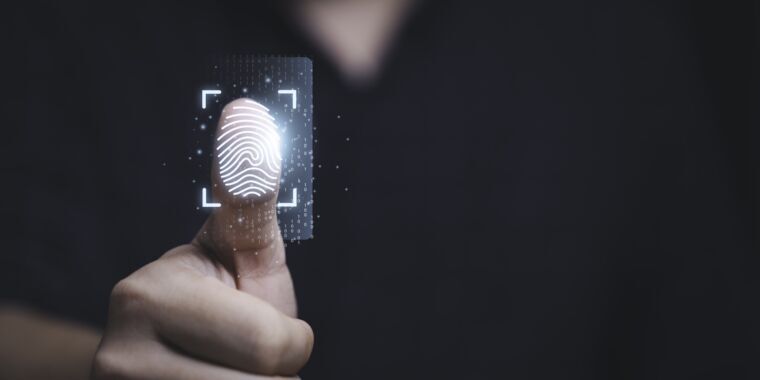- cross-posted to:
- privacy@lemmy.ml
- cross-posted to:
- privacy@lemmy.ml
Just don’t ever use biometrics for anything.
But then you’ve created dozens (or hundreds) of opportunities a day for someone to get your passcode by shoulder-surfing, which you probably wouldn’t even notice in many situations. I’d argue that unless someone forcibly borrowing your face or fingers to unlock your phone is a strong possibility, entering a passcode each time is less secure than using biometrics.
Especially since the passcode also protects various security settings.Trying to or successfully shutting down will quickly disable it. I don’t think the USA is at the point where we should all worry about arbitrary arrests.
I don’t think the USA is at the point where we should all worry about arbitrary arrests.
“All” may not need to worry, but there are plenty of people who do experience them.
First they came for the socialists, and I did not speak out—
Because I was not a socialist.
Then they came for the trade unionists, and I did not speak out—
Because I was not a trade unionist.
Then they came for the Jews, and I did not speak out—
Because I was not a Jew.
Then they came for me—and there was no one left to speak for me.I don’t think the USA is at the point where we should all worry about arbitrary arrests.
Wrong!
Well, I can confirm from personal experience (me and family) that tourists wanting to enter the US aren’t treated that much differently from criminals.
I’ve resisted them so far 😇
This very reason is why I cut off both thumbs. Can’t force me to unlock my phone with my thumb print now. Checkmate, cops.
I use a mushroom stamp as biometric login.
https://play.google.com/store/apps/details?id=com.merrycachemiss.rl
I found this app that helps to mitigate this issue. It disables fingerprint if your phone gets too far away from a Bluetooth wearable or in several other conditions. It’s worth looking into for sure though it is only in preview for now.
I think it’s an excellent choice for anybody that’s got to wearable. You could probably do all this with past or two if you had the free time, which I do not.
So like it disables then stays disabled until you manually re-activate?
So a confiscated phone goes into lockdown mode?
Yeah. It’s pretty rad. I’ve been playing with it all day.
If I set my watch and airplane mode it also immediately locks the phone, but it also does that when it goes out of range. It looks like the app should work with any Bluetooth device so any wearable should work just fine or even earphones if you really wanted.
Can they force you to look at your phone though? Attention aware Face ID requires eyes ball on screen.
And as others have stated, holding volume up and power u til the iPhone vibrates locks the phone requiring the passcode.
In Android, holding power and selecting “lockdown” locks out access until your pin is entered. However, if you’re at a protest or something where illegal arrests are likely, turn your phone 100% off.
This is why multiple factors is important something you are, something you have, something you know.
“Use a
penPIN, Sideshow Bob.”For people who want to use multi-factor to unlock their phone, on Android you can set a unlock code for the work profile. So you can have one factor to unlock the main phone, and one factor to unlock the work profile. So any app in the work profile, like signal messenger, would require you to both put your pin in for one factor, your fingerprint in for another factor.
Some ROMs like graphineos allow you to scramble the pin input pattern, which means the grease on the phone doesn’t give too many clues away as to what your pin is. You get used to it after a day or two
Removed by mod
🤖 I’m a bot that provides automatic summaries for articles:
Click here to see the summary
The US Constitution’s Fifth Amendment protection against self-incrimination does not prohibit police officers from forcing a suspect to unlock a phone with a thumbprint scan, a federal appeals court ruled yesterday.
The ruling does not apply to all cases in which biometrics are used to unlock an electronic device but is a significant decision in an unsettled area of the law.
Judges rejected his claim, holding “that the compelled use of Payne’s thumb to unlock his phone (which he had already identified for the officers) required no cognitive exertion, placing it firmly in the same category as a blood draw or fingerprint taken at booking.”
Payne conceded that “the use of biometrics to open an electronic device is akin to providing a physical key to a safe” but argued it is still a testimonial act because it “simultaneously confirm[s] ownership and authentication of its contents,” the court said.
The Supreme Court “held that this was not a testimonial production, reasoning that the signing of the forms related no information about existence, control, or authenticity of the records that the bank could ultimately be forced to produce,” the 9th Circuit said.
The Court held that this act of production was of a fundamentally different kind than that at issue in Doe because it was “unquestionably necessary for respondent to make extensive use of ‘the contents of his own mind’ in identifying the hundreds of documents responsive to the requests in the subpoena.”
Saved 64% of original text.








